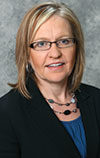You are not happy about the negative light this article has placed on your industry – but responding to these claims might not be in your comfort zone. What can you do?
This is where the value of building a network comes in. Building a solid network of people in agriculture you can call on when you need an answer, advice or are seeking additional information can be tremendously valuable.
Building a network group
You don’t have to have any special degrees or titles or a certain number of years of experience to start to build a network group. You can start anytime. Begin by making a list of people you have a common relationship with – other beef producers, neighbors, someone who serves on a community or livestock board with you, etc. – people you have confidence in.
People you know well, have been friends or co-workers with for some time or the person who has been mentor/adviser/consultant to you.
The key is: You want to select people you trust. From a business perspective, when you are building a network group, you will be relying on these individuals for some very critical and imperative issues which might include financial or legal issues or elements that may impact the viability of your farm/ranch. You need to be totally confident of these people’s authenticity.
Why are networks valuable?
John Spence – who at 26 years old was CEO of an International Rockefeller Foundation and a keynote speaker at the National Cattlemen’s Beef Association Cattle Industry Convention, San Diego, California, Jan. 26-29 – emphasized the value of having a network of people to help you when faced with challenges in your business.
“The idea behind a network is when an issue arises with you or someone in your network, that question can be sent out to the network group, and the best minds you have congregated in your network will be there to help solve the issue rather than just you.”
In fact, during his years in the corporate business world, Spence established a 700-person core group worldwide for his network group. He explained that when one member of the group needs help, they send out an inquiry to the entire group, and immediately some of the best minds in the corporate financial business world are there to help out this individual.
As a result, a problem can be solved in hours or a day rather than weeks or months. “I don’t have to worry anymore if someone or myself has an issue or a challenge; I know I will have the answer because I have 700 minds I trust there to help me.”
Spence encouraged cattle industry producers to do the same. “Start building a network; whether it’s two or 100, soon you will have a powerful group you can surround yourself with to help you when you are in need of seeking advice or resources.”
However, Spence cautioned that when building a network, you have to do your part. “You must give 90 percent of the time in order to take 10 percent of the time. You have to share, give ideas and give advice when asked if you expect when you are in need of help the group will be there to assist you.”
Can you imagine if you or your local cattlemen’s organization is dealing with an issue, and you seem to be running into roadblocks and wonder if someone else might just have an idea, a connection, a resource you don’t have or haven’t thought of?
With a developed network group, you can forward your question or issue to these trusted resourceful individuals and receive feedback that might be just the solution you were seeking.
Different networks for different focuses
Individuals may want to form network groups for different concept areas, like beef production, financial management or local/community issues. The best way to build your network is to get active. Join groups, clubs and organizations; be visible and demonstrate you are credible.
Certainly social media is a great outreach to a large number of people. These sites offer great exposure, but if you want to use social media as your platform to outreach to your network group, learn how to set up a private group that is password-protected or by invitation only, as you will want to keep your group’s discussion private.
Building a strong network of people who want to help you, and you want to help them, confirms more minds can be better than one. ![]()

-
B. Lynn Gordon
- Teaching Learning and Leadership
- College of Agricultural and Biological Sciences and College of Education
- South Dakota State University
- Email B. Lynn Gordon






